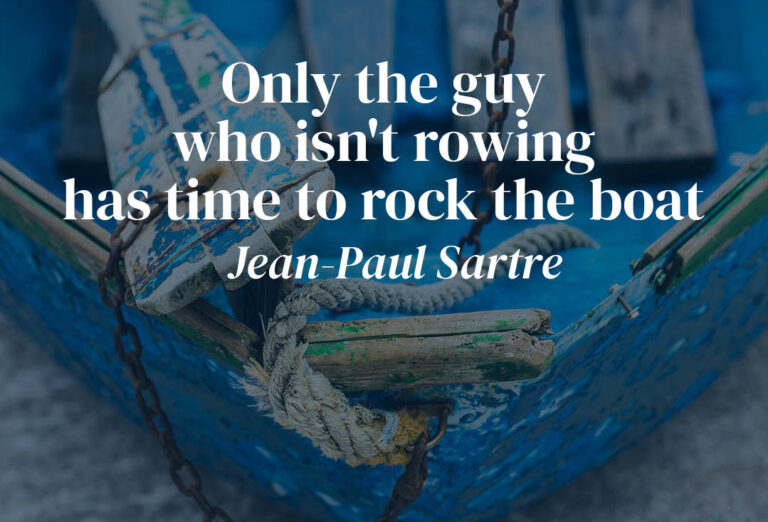
Page Description
Understand the meaning of ‘rock the boat,’ an idiom used to describe causing disruption or creating problems in a stable situation.

If you rock the boat, you do or say something that will upset people or cause problems.
Don’t rock the boat until the negotiations are finished.
Time for Real Accountability
The Post Office scandal has shaken the foundations of trust in British institutions. What began as technical glitches in accounting software became a full-blown crisis of justice, leading to the wrongful prosecution of hundreds of innocent Subpostmasters.
For years, those in power turned a blind eye. Now, the tide is turning.
In the videos below, two critical voices speak out. TalkTV’s Ian Collins asks the pressing question: Who should be held accountable? And Ian Henderson, co-founder of investigative firm Second Sight, reveals how the warning signs were visible long before convictions were made.
These conversations are part of a growing call to confront the truth — and to hold those responsible to account.
Tijd voor Echte Verantwoording
De Post Office-zaak heeft het vertrouwen in Britse instellingen tot op het bot aangetast. Wat begon als technische fouten in boekhoudsoftware, groeide uit tot een grootschalige gerechtelijke dwaling waarbij honderden onschuldige Subpostmeesters ten onrechte werden vervolgd.
Jarenlang keek men weg. Nu begint het tij te keren.
In de onderstaande video’s laten twee belangrijke stemmen zich horen. TalkTV-presentator Ian Collins stelt de cruciale vraag: Wie moet er verantwoordelijk worden gehouden? En Ian Henderson, medeoprichter van onderzoeksbureau Second Sight, vertelt hoe de signalen al jaren vóór de veroordelingen zichtbaar waren.
Deze gesprekken maken deel uit van een steeds luidere oproep om de waarheid onder ogen te zien — en degenen die verantwoordelijk zijn ter verantwoording te roepen.
The idiom “rock the boat”
The idiom “rock the boat” is a metaphorical expression that means to disrupt the status quo, create trouble, or cause conflict by challenging existing conditions, beliefs, or systems. When someone is advised not to “rock the boat,” it implies that they should avoid making waves or stirring up controversy in a particular situation. The idiom is often used to caution against challenging established norms or upsetting a stable environment. On the other hand, some contexts may encourage individuals to “rock the boat” to bring about positive change or address issues that need attention. Overall, the meaning of the idiom depends on the specific situation in which it is used.
De uitdrukking “rock the boat” is een metaforische zegswijze die betekent dat iemand de status quo verstoort, problemen veroorzaakt of conflicten oproept door bestaande omstandigheden, overtuigingen of systemen ter discussie te stellen. Als iemand wordt aangeraden om de boot niet te laten schommelen (not to rock the boat), betekent dit meestal dat diegene geen onrust moet veroorzaken of controverses moet vermijden in een bepaalde situatie. De uitdrukking wordt vaak gebruikt als waarschuwing om gevestigde normen niet uit te dagen of een stabiele situatie niet te verstoren. Anderzijds kan de uitdrukking ook worden gebruikt in contexten waarin men juist wordt aangemoedigd om de boot wél te laten schommelen, om positieve verandering teweeg te brengen of misstanden aan te kaarten die aandacht nodig hebben. De betekenis van de uitdrukking hangt dus af van de specifieke situatie waarin zij wordt gebruikt.
“Only the guy who isn’t rowing has time to rock the boat”
The quote “Only the guy who isn’t rowing has time to rock the boat” is often attributed to Jean-Paul Sartre, a French philosopher, playwright, and political activist. While it captures a similar sentiment to the idiom “rock the boat,” it adds a layer of meaning by suggesting that those who are not actively contributing or participating in a task or endeavor are the ones more likely to cause disruptions or disturbances.
In a broader sense, the quote emphasizes the importance of engagement, responsibility, and collective effort. It implies that individuals who are actively working towards a common goal, represented metaphorically by “rowing the boat,” are less inclined to create problems or disrupt the group’s harmony. On the other hand, those who are not actively involved may find the time and inclination to stir up trouble.
The quote aligns with Sartre’s existentialist philosophy, which often focused on individual responsibility and the consequences of one’s actions. It suggests that being actively involved and contributing to a shared purpose can lead to a more harmonious and productive collective effort.
In conclusion, Sartre’s quote “Only the guy who isn’t rowing has time to rock the boat” has become a popular saying that has been applied to a variety of contexts. Its meaning can be interpreted in different ways, but at its core, it speaks to the importance of taking action and responsibility. Whether it’s in the context of personal responsibility or social and political activism, Sartre believed that individuals have a duty to act in accordance with their values and beliefs.
In a world that often feels chaotic and uncertain, it’s easy to become overwhelmed or complacent. However, Sartre’s quote serves as a reminder that inaction can have consequences just as severe as taking the wrong action. By “rowing the boat” and taking responsibility for our actions, we can work towards creating a more stable and just world.
“Alleen degene die niet roeit, heeft tijd om de boot te laten schommelen.”
Het citaat “Alleen degene die niet roeit, heeft tijd om de boot te laten schommelen” wordt vaak toegeschreven aan Jean-Paul Sartre, een Franse filosoof, toneelschrijver en politiek activist. Hoewel het aansluit bij de uitdrukking “de boot laten schommelen”, voegt het een extra betekenislaag toe: het suggereert dat juist degenen die niet actief bijdragen of betrokken zijn bij een taak of onderneming, eerder geneigd zijn om onrust of verstoring te veroorzaken.
In bredere zin benadrukt het citaat het belang van betrokkenheid, verantwoordelijkheid en collectieve inzet. Het impliceert dat mensen die actief samenwerken aan een gemeenschappelijk doel – metaforisch voorgesteld als “roeien in de boot” – minder geneigd zijn om problemen te veroorzaken of de harmonie binnen de groep te verstoren. Daarentegen zijn degenen die zich niet inzetten juist eerder geneigd om moeilijkheden te veroorzaken, simpelweg omdat zij daar de tijd en ruimte voor hebben.
Het citaat sluit aan bij Sartres existentialistische filosofie, die vaak draaide om individuele verantwoordelijkheid en de gevolgen van iemands handelen. Het suggereert dat actieve betrokkenheid en bijdragen aan een gedeeld doel kunnen leiden tot een meer harmonieuze en productieve samenwerking.
Tot slot: Sartres citaat “Alleen degene die niet roeit, heeft tijd om de boot te laten schommelen” is uitgegroeid tot een bekende uitspraak die in allerlei contexten wordt toegepast. De betekenis ervan is op verschillende manieren te interpreteren, maar in de kern benadrukt het het belang van handelen en verantwoordelijkheid nemen. Of het nu gaat om persoonlijke verantwoordelijkheid of om sociale en politieke betrokkenheid: Sartre geloofde dat individuen de plicht hebben om te handelen in overeenstemming met hun waarden en overtuigingen.
In een wereld die vaak chaotisch en onzeker aanvoelt, is het gemakkelijk om je overweldigd te voelen of passief te blijven. Toch herinnert Sartres citaat ons eraan dat niets doen even verstrekkende gevolgen kan hebben als verkeerd handelen. Door zelf “te roeien” en verantwoordelijkheid te nemen voor onze daden, kunnen we bijdragen aan een stabielere en rechtvaardigere wereld.
Who Should Be Held Accountable For The Post Office Scandal?
8 jan 2024
The wrongful convictions of hundreds of subpostmasters due to faulty digital accounting software has been described as the most widespread miscarriage of justice in UK history.
The scandal has recently come back into the spotlight following ITV’s four-part drama Mr Bates vs The Post Office.
TalkTV’s Ian Collins asks who should be held accountable.
REVELATION: ‘Astonishing story’ of Post Office scandal noticed long before convictions made
Mailman Steals From Birthday Cards
9 dec 2019
I don’t want to get too technical, but the phrase does go “Finders, keepers; Losers, weepers”.